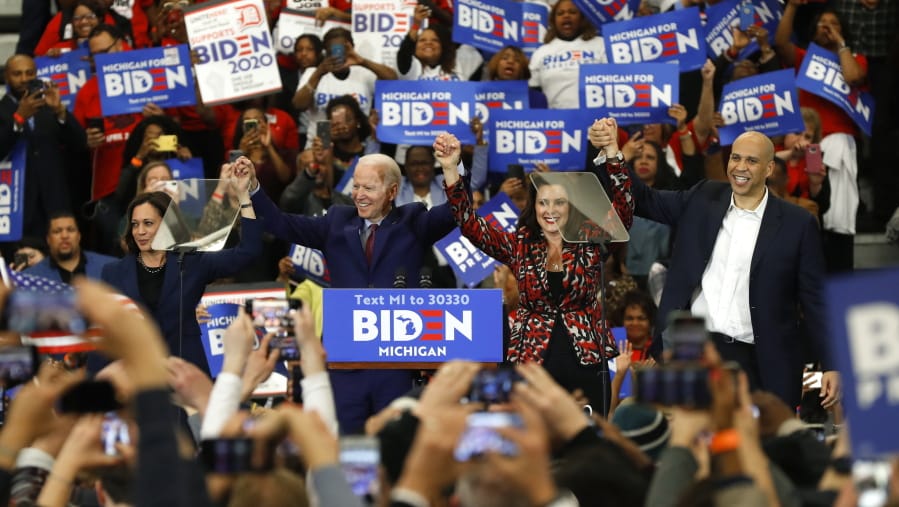Democrats officially adopted a platform at their convention this week that calls for a sweeping overhaul of campaign finance laws, including forcing the disclosure of covert sources of political spending money that right now is helping to boost the party’s candidates for the House, Senate and White House.
Big donors, super PACs and nonprofit organizations that may shield their donors’ identities are going all in for the 2020 campaigns, funding ads and other efforts for candidates in both parties.
Yet if Democrats hold the House and win control of the Senate and White House, activists say expect they plan to step up the pressure on the party to revamp the nation’s political-money system, even though it would be that system that helped put them in charge. That still will be no simple task: Getting such legislation through the Senate would almost certainly require an elimination of the filibuster, since Democrats are unlikely to hold the 60 seats necessary.
“We think we’re on the verge of a historic opportunity to enact unprecedented democracy reforms, including small-donor public matching funds, depending on the outcome of the election,” said Fred Wertheimer, who runs the campaign finance overhaul group Democracy 21.
Judging Democrats Super PACs and nonprofit organizations are investing millions of dollars to benefit the Democratic presidential ticket of former Vice President Joe Biden and Sen. Kamala Harris of California, whose campaign has said it supports campaign finance overhauls. Ditto for Democratic Senate and House candidates. But Wertheimer and others say they don’t see another way to get what they want.
“We recognize that no one’s going to sit there while the other side is doing this,” he said. “They are legal. Otherwise, you’ll get murdered if the other side is using it, which they are. We judge where office holders are by what they are prepared to actually do to repair the system.”
Democratic operative Cooper Teboe, whose fundraising clients include progressive Rep. Ro Khanna of California as well as a pro-Biden super PAC Unite the Country, says that to expect Democrats to “play by a different set of rules” in the absence of an overhaul “would be to cede this election.”
A new report of the Wesleyan Media Project found that about half of the spending on House and Senate ads since mid-July was from so-called “dark” money groups, nonprofit organizations that do not have to disclose the identities of their donors. Among the biggest spenders was House Majority Forward, which backs Democratic candidates, the Wesleyan report concluded.
Such groups had been required to disclose their donors to the Internal Revenue Service, but that requirement was overturned by President Donald Trump’s administration.
In the presidential race, both campaigns have formed joint fundraising committees with other party accounts that allow them to accept contributions far above the $2,800-per-election limit on individual donations. As a result, a donor could give more than $730,000 to the Biden Victory Fund and more than $580,000 to Trump Victory.
That may give voters cause for concern about whether Democrats will work to implement sweeping changes along the lines of an overhaul (HR 1) that House Democrats passed early in 2019.
“Clearly there’s a disconnect between what the Democratic Party platform says and how the 2020 campaign is being run,” said Michael Beckel, research director at Issue One, a campaign finance overhaul group.
Ciara Torres-Spelliscy, a professor at Stetson University’s College of Law, says Democrats should do more to keep the issue at the forefront, even as the party’s candidates tend to focus more on health care and economic matters amid the COVID-19 pandemic.
“The more voices you can get to say the same messages, identify the same problems dark money, corporate money and then repeat that message, that’s where you get buy in from the American people,” said Torres-Spelliscy, author of the book “Political Brands.” She added that voters may lose sight of campaign finance scandals, such as the conviction of former Trump insider Michael Cohen over payments to adult film star Stormy Daniels that were considered illegal campaign contributions.In events tied to this week’s Democratic convention, candidates and lawmakers that span the party’s ideological divide seemed to talk with a common theme on political money.
Take the examples of Alyse Galvin, an independent who would caucus with Democrats running for Alaska’s at-large House seat, and Rep. Pramila Jayapal, a Democrat from Washington state who is co-chair of the Congressional Progressive Caucus.
Jayapal said that among a Biden-Harris administration’s top priorities should be to “get money out of politics and take on corporate corruption,” including through such measures as HR 1.
Galvin, when asked at an event to promote women candidates what the first bill she would sponsor would be about, responded: “Get rid of dark money, get it out of politics and make sure that the Senate and the executive comes along with that one. That’s a great one.”
In making his pitch to progressives in a United Against Trump virtual event Tuesday, Sen. Bernie Sanders of Vermont said that if Democrats win the White House and Senate and keep the House, “There is a path open for us to really bring about transformative change in this country.” First on his list of examples were measures to reform the nation’s “corrupt political system.”
“Democratic leaders are going to have to listen,” he said.



